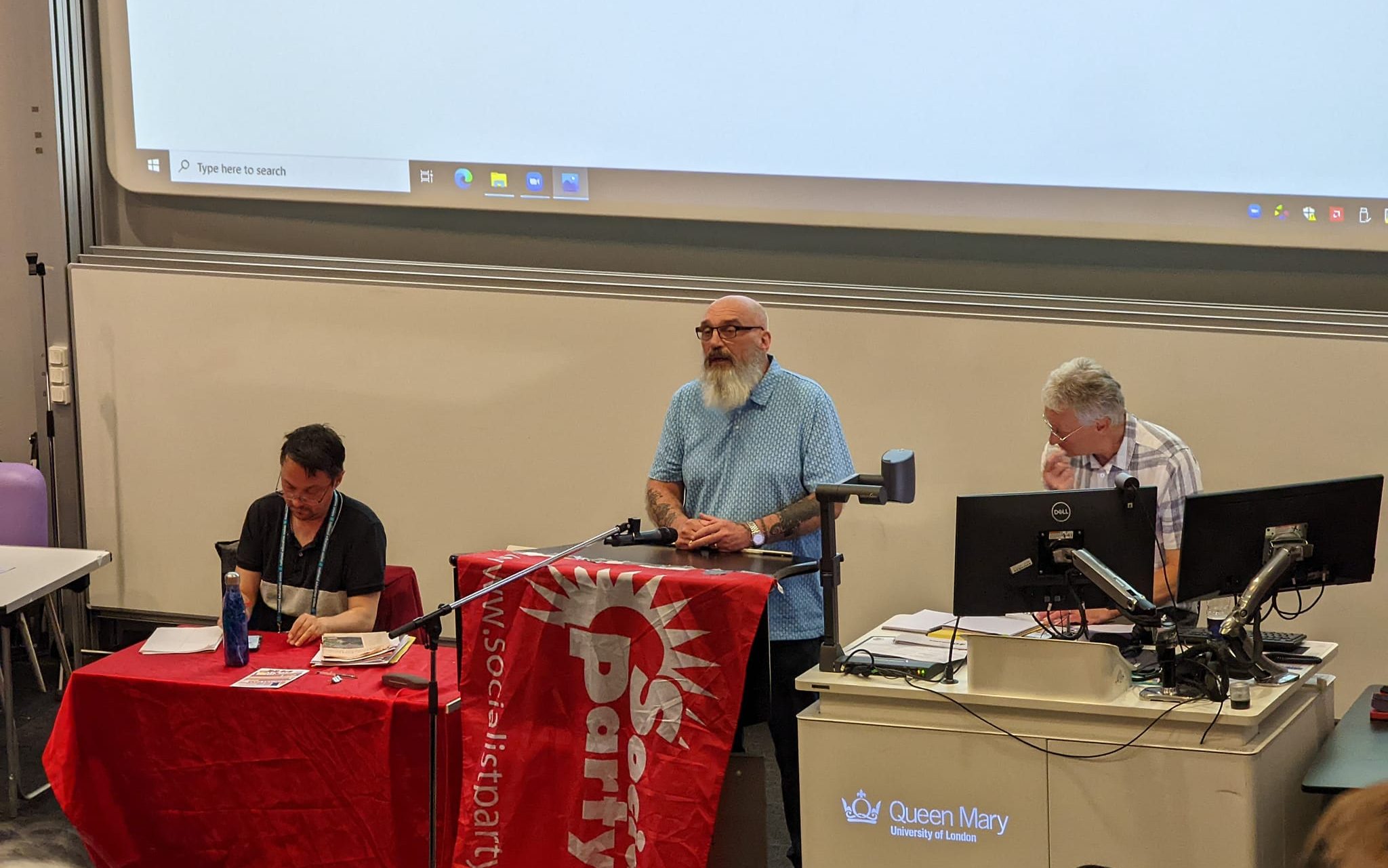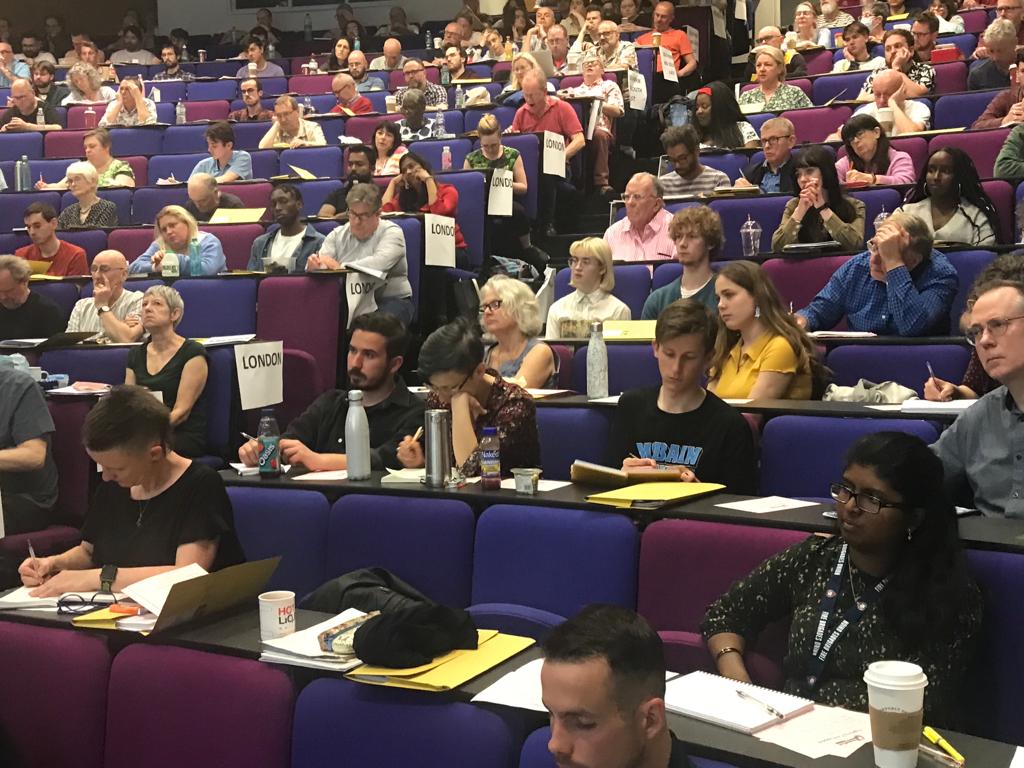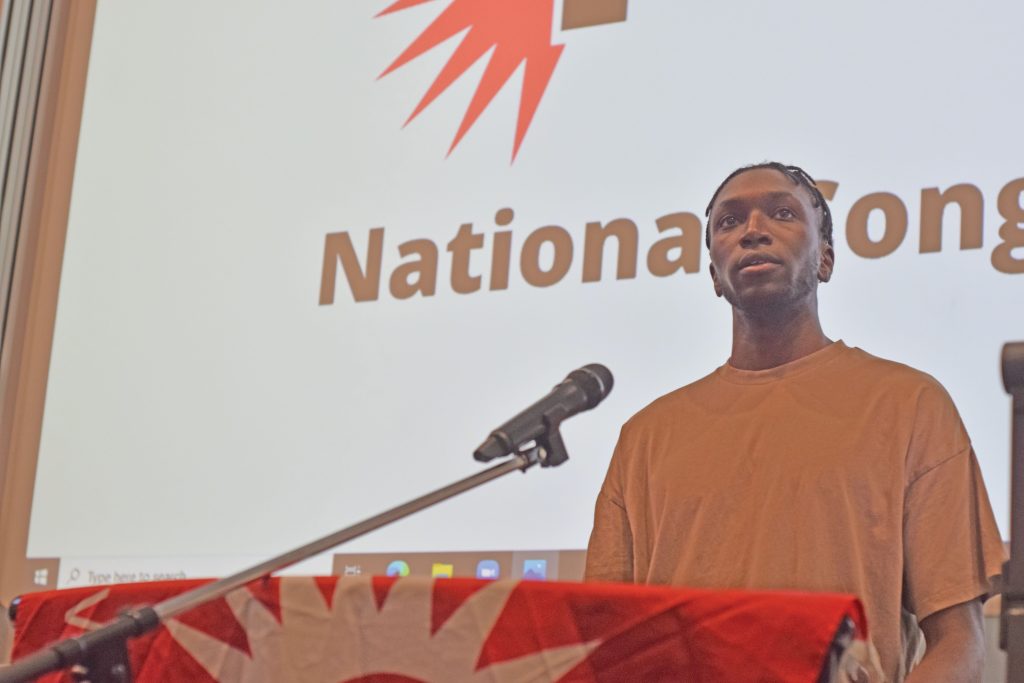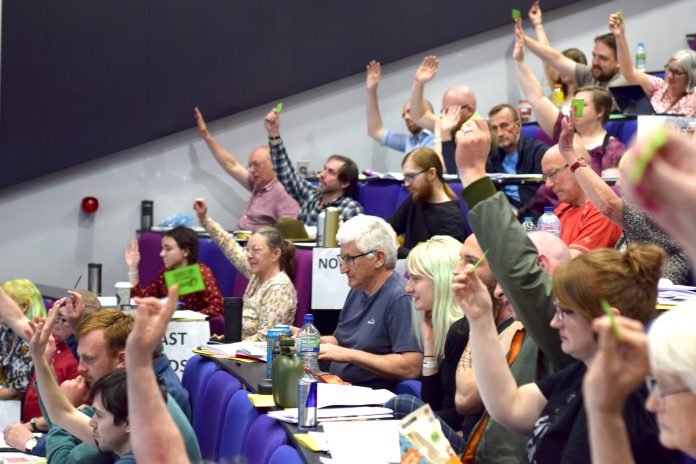Socialist Party congress took place from 14 to 16 May in London – the first since February 2020 because of Covid. Congress is the most important democratic decision-making body of the Socialist Party. It is always a very important event, an opportunity to step back to clarify our ideas. Kevin Parslow writes about some of the important points raised during the weekend’s discussions.
World revolt is on agenda
The first discussion was on perspectives for the world situation, introduced by Socialist Party general secretary Hannah Sell. Hannah explained how all aspects of society are in flux due to Covid. And that there was never any prospect of the post-pandemic world under capitalism being sunny uplands.
There has been a dramatic escalation of crises, and a fall in living standards internationally. These will lead to revolts around the world.
This process is typified by events in Sri Lanka, which are a foretaste of what will develop in other countries, the “first domino to fall”, as Jim Hensman from Coventry later put it (see ‘Sri Lanka: Biggest mass movement and strike forces prime minister’s resignation’).
Ukraine
But the other side of world developments has been the increased level of tension between nation states, exemplified in its most brutal form by the war in Ukraine. This is a turning point in world relations. The war has emphasised the uncertainties now endemic in the capitalist system internationally.
The Ukraine war is in part a proxy war between Russia and Nato. That it is taking place is a symptom of the decline of US imperialism which, while still the world’s strongest powers, is increasingly unable to ‘call the shots’.
The Putin gangster-capitalist regime invaded Ukraine, knowing the US and Nato would be powerless to prevent it – particularly as only a few months ago the US had to retreat from Afghanistan.
However, the war will weaken Putin’s regime and prepare the ground for gigantic struggles in Russia. The western capitalist powers will also be weakened further by the Ukraine war.
Europe has both tensions between nation states and within them. Germany, the economic ‘powerhouse’ of Europe, is in crisis, and Macron won the support of only 38% of voters in the second round of French elections.
The pandemic and Ukraine war have caused enormous economic dislocation. But Hannah made the point that the capitalist economy was already in crisis even before the pandemic, and had not recovered from the 2007-09 financial crash.
Socialist Party national committee member Robin Clapp later said the “world economy was on a precipice”, with experts predicting slowdowns in growth or recession internationally. Any ‘solutions’ to capitalism’s problems will increasingly create new problems and help prepare massive social explosions.
Hannah pointed out there is also a crisis in the leadership of the workers’ movement internationally. However, some sections of workers are fighting back – in France where there were big May Day demos warning President Macron not to attack living standards in his second term.
The movement for left-winger Jean-Luc Mélenchon in the first round of presidential elections can be replicated in other countries (see ‘Mélenchon vote shows potential’). The intensity of the crisis and the experience of left formations mean lessons can be learnt, and new formations can have a more explicitly working-class character.
Sometimes right-populists gain from the current vacuum in the workers’ movement. But Hannah concluded on an optimistic note, that new working-class formations will emerge and help to build the forces leading the struggle for socialism.
Climate change
Socialist Party members spoke in the discussion with points on South Africa, the Spanish state, France, and the escalating crisis throughout the Middle East. Nathan Sharpe from Nottingham commented on the effects that climate change will have on the global economy.
Concluding the discussion, Tony Saunois – general secretary of the Committee for a Workers’ International (CWI), the socialist international organisation the Socialist Party is part of – pointed to mass movements in Sri Lanka and Argentina now putting a general strike on the agenda, which poses the need for workers to take power in society.
The discussion gave us the outlines of likely developments in the next period as a guide to action in building socialist ideas internationally.
Social explosion is inevitable in Britain
The pressure building up against the cost-of-living squeeze and falling living standards will find outlets. Judy Beishon, Socialist Party executive committee, introduced the discussion on the political situation in Britain.
The Tories gave the working class facing rising prices no crumbs in the Queen’s Speech. Some Tories worry about the consequences of this, with working-class anger brewing.
The Tories are greatly divided and the Boris Johnson government is reckless regarding capitalist interests.
Tory division
Tory divisions have also opened up again on the Northern Ireland protocol. Underlying the Tories’ crisis is the dire economic situation facing British capitalism and its long-term weakness.
The anti-Tory vote in the local elections went in many directions. Labour only benefited from that to a limited degree, because Keir Starmer has removed Jeremy Corbyn’s more attractive policies from its programme.
Nevertheless, a Labour general election victory can’t be discounted, because of the hatred of the Tories. If Jeremy Corbyn or the trade unions initiated a new party, it would have big potential to grow. In any case, a new mass workers’ party is urgently needed.
The role of the trade unions in organising workers, including in the gig economy, will be vital. The right-wing union leaders will view the Trades Union Congress (TUC) demo on 18 June as a chance to let-off steam rather than to prepare for coordinated action. But workers, and left union leaders, can build for it as a step towards taking action forward.
The Covid pandemic and now the cost-of-living crisis have impacted on workers’ consciousness and readiness to resist attacks. Judy concluded that this would make social explosions inevitable.

The first speaker in the discussion was Coventry bin worker Haydn Jones. His experience in the strike against a right-wing Labour council has convinced him that Labour is no longer a party for workers.
He and seven colleagues have joined the Socialist Party. His contribution – as a “proud member of the Socialist Party” – received a massive ovation.
Mark Evans, from Swansea and West Wales Socialist Party, noted the anger in society, yet a feeling of impotence exists for many at present. This is not true for every worker, particularly those who have struggled. Once it moves, the working class is an unstoppable force, he said.
Others described battles over poverty, housing and health, in which the Socialist Party has participated. Len Hockey – Unite the Union secretary at Barts NHS Trust – described the strike victory against Serco. The workers will now be taken back in-house next year. The lessons from the workers’ battle should be translated into a programme of action for the NHS nationally, he said.
Change and instability
Rob Williams, the Socialist Party workplace and trade union organiser, replied to the discussion. It is not grinding poverty or misery alone that lead to struggle developing, but also the insecurity felt by changing conditions and economic instability. Rob said there is not another party that supports and engages with workers’ disputes as much as we do, and participates as seriously.
There is a rising tide of workers’ militancy. But the threat of recession could mean a new phase, and change the character of workers’ disputes from offensive battles over pay, to defensive ones on jobs and conditions. The Socialist Party is also giving a lead in the unions on the question of political representation for the working class.
Fighting for socialism from Carlisle to Cornwall
You can be active in the Socialist Party anywhere between Cornwall and Carlisle fighting for socialist ideas. We are building both in areas where activity has just begun or restarted, like Swindon, Salisbury, or Bournemouth, and in cities where we are extending our influence.
Sarah Sachs-Eldridge, for the executive committee, introduced the discussion on how to strengthen and build our party to get socialist ideas out to workers and young people. Our members have not only maintained but built the party through determination and self-sacrifice. Even in the difficult period of the pandemic, we participated in all the main struggles that took place, often as the biggest organised presence like in the Black Lives Matter protests and many industrial struggles, boldly offering ideas.
TUSC

In the Erdington by-election Socialist Party members stood a Trade Unionist and Socialist Coalition (TUSC) candidate and made a bold case for building a new mass workers’ party. Members took this message and our programme for building fighting trade unionism to the struggles of bin workers in Coventry, Rugby and elsewhere. Our party strives to be a lever on events – a small organisation helping to move something so much bigger than itself, as we did in the poll tax battle and the campaign of Liverpool City Council in the 1980s.
Our branches and their meetings are important to discuss ideas and plan the work, but also to develop the political education of every member through reading and discussing Marxist ideas. Every area has to have a strategy to build, and use it to develop its influence in the local workers’ movement, Sarah concluded.
In the discussion Linda Thraves, branch secretary of Swansea and West Wales, emphasised how branch meetings are the priority, and the role of the branch secretary is vital in organising these. Our meetings are also part of every member’s democratic responsibilities, she said.
Ali Cook, a young member organising our work in Salisbury, explained how important sustaining our regular public activity, selling the Socialist and discussing our ideas is for finding new members for the party.
Victories
A broad sweep of reports of interventions was given, including into election campaigns, paper sales and stalls, trade union and community campaigns, like in Southampton, where the St Mary’s Leisure Centre has been saved by a determined campaign. Particularly inspiring were the reports of groups of workers who have been attending party branches to listen to and discuss our ideas.
Confidence and enthusiasm came through in every contribution from newer members and those with years of experience. And Isai Marijerla replied to the discussion by explaining that is because we have the confidence that capitalism can be got rid of. Workers in struggle see us as allies, whether in disputes or in social movements.
Socialist ideas for people looking for answers
For the last eight months, Socialist Party members have been discussing a new draft programme for the party. This had been circulated in a publicly available ‘What We Stand For’ pamphlet.
Throughout that eight-month discussion, members have suggested additions and amendments. Lenny Shail, speaking on behalf of the Socialist Party executive committee, explained that the programme encapsulated how we are adapting to a changed situation.
The What We Stand For document points to the workplace as the site of developing struggles – where the battle is over the surplus value created by the working class, but expropriated by the capitalists – and how workers’ consciousness can develop during struggle.
The Socialist Party’s programme helps to draw new people into the party. Our programme is subject to continuous discussion and development.
Mia Hollsing from Wales welcomed What We Stand For for not falling into the traps of either promising reforms without socialist change, or stating baldly that only socialism can solve our problems, without dealing with the specific needs of workers.
Clive Heemskerk, in his reply to the discussion, promised that the updated What We Stand For would now be produced as a pamphlet.
One main thrust of the document is how does the working class rebuild its organisations. The conditions of the working class today are reminiscent of the late 19th and early 20th centuries – casualised and with little rights – but, just as that was the time when a workers’ political party was founded, still with the possibility of leading the struggle for socialist change.
What We Stand For serves a purpose for this period after the defeat of Corbynism, with many looking for answers as to the way forward.
£18,433 raised in fantastic finance appeal
The cost-of-living squeeze affects the Socialist Party too! Ryan Aldred, a Socialist Party organiser in south west England, inspired people at congress to increase their regular membership subs to the party.
For the Socialist Party, raising finance is not separate from the other important work we do, said Socialist Party treasurer Isai Marijerla.
Socialist Party national committee member Dave Griffiths has actively supported the Coventry bin workers’ strike. Dave gave a witty but determined fighting fund appeal.
Workers need a force with which to fight back, he said, and the Socialist Party provides a political alternative. We need the cash to go full steam ahead in our campaigning. We are the people with an idea of what to do in the trade union movement. His appeal for funds raised a magnificent £18,433.
Youth anger will burst out
In every session of the congress young members spoke, showing the growth of the Socialist Party among a new generation faced with the need to fight for a future.
Youth organiser Theo Sharieff introduced a discussion dedicated to this central plank of our party’s work – boldly offering young people socialist ideas to fight for their future.
All the problems facing older workers – cost-of-living crisis, housing, etc – affect youth, sometimes even more sharply. The anger of youth will find an outlet somewhere, and our party is readying to participate wherever that anger explodes.

Ferdy Lyons, a hospitality worker from east London, spoke on how Unite the Union is organising in that industry – the largest employer of young workers. Unite is launching a workers’ combine for all its members in hospitality. We will help that with our socialist ideas and methods to attract to the unions as many young workers as possible. Socialist Party members are building support for the Youth Fight for Jobs campaign alongside others.
Other speakers discussed how we fight alongside young workers in the civil service and the NHS. Tony Bligh from Plymouth related the difficulty of working three jobs to clear debts accumulated during lockdown. The idea of a living wage of £15 an hour for all is vital to stop the exploitation of young workers ‘earning’ as little as £4.81 an hour.
Amy Sage from Bristol discussed the real challenges to organising among young people when the problems are many and the understanding of how to fight for a socialist alternative is relatively low.
Socialist Party members in the universities play leading roles in many Socialist Student societies. On campuses the official student organisations have abandoned the fight for free education and have not offered a lead on the fight against cuts, for women’s safety or in solidarity with the UCU.
Helen Pattison – summing up on behalf of the Socialist Party executive committee – said that young members of the Socialist Party (and even ‘less young’ members) have a really important role to play in getting Marxist ideas and methods of organisation out among a new generation.
Marxism and women’s oppression in the new era
This final discussion was introduced by Christine Thomas for the executive committee. The Covid pandemic, she said, has further exposed the level and extent of women’s oppression. Pre-existing inequality means women are still responsible for most household and caring tasks. And in the workplace, women workers are on average paid 20% less than men if they are in full-time work.
So when Covid struck, women were more likely to quit jobs and work less hours, while also juggling demands of home working, education and childcare. But lockdown has also had a radicalising effect on a layer of women, who are questioning why gender inequality is still so pervasive as well as moving into struggle against the bosses trying to make workers pay.
The pandemic was also the backdrop to the protests following the murder of Sarah Everard. Internationally, anger at the inequality caused by the 2007-08 economic crisis had spilled over into anger at all forms of inequality and injustice; the context for huge protests by women against issues such as gender violence, sexism and reproductive rights. In the US the likely Roe v Wade overturn is provoking new protests.
Inherent in the current situation are more flare-ups and protests, including over gender inequality issues. Movements by women internationally in the last few years have won reforms, such as the right to abortion in Ireland, and Argentina.
But because of the economic crisis of capitalism, and the way the system is structured and organised, there are also limitations to movements that are restricted to changing the law and changing attitudes. Socialists have to intervene and try to orientate movements towards the working class and the trade unions, to also fight for concrete demands like equal pay, childcare, housing, refuges, health care etc, linking those to the struggle to change the system.
Class society is the root cause of women’s oppression and only overthrowing capitalism will lay the basis for the ending it.
in the discussion, delegates spoke about how more women seem to be interested in our ideas; our interventions in the Sarah Everard protests and campaigns against sexism and for women’s safety; our proud history of fighting on issues of concern to women such as through the Campaign Against Domestic Violence in the 1990s, which was taken up by the trade unions, or the menopause campaign fought for in the teachers’ unions.
Bea Gardner, a new parent, explained how under capitalism mothers face impossible challenges from the expense of childcare when going back to work and how some working-class women are debating whether it is financially worthwhile to go back to work after maternity leave. She and other parents are developing the socialist programme for parents!
Faria Attique from West London talked about the barriers facing women of a South Asian background and the patient work she is involved in to develop our socialist programme in a way that offers a way forward.
The final contribution from the floor came from Lynn Gunnigle from Devon, who joined the Socialist Party two years ago. Women, she said, are conditioned to feel useless, but the Socialist Party had empowered her.
Sarah Sachs-Eldridge summed up a “fabulous discussion”, in which we had all learnt a lot. Every branch should now plan to continue this discussion – and all the discussions at Congress – as part of preparing the Socialist Party to be ready to offer a way forward to all those entering struggle.








